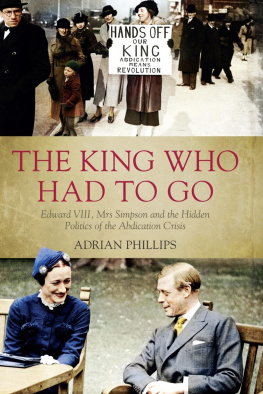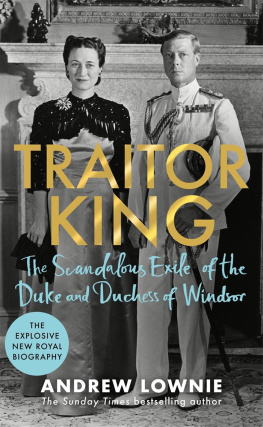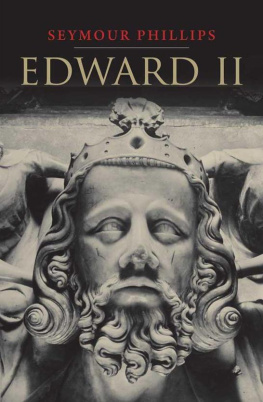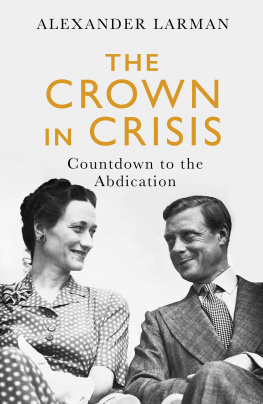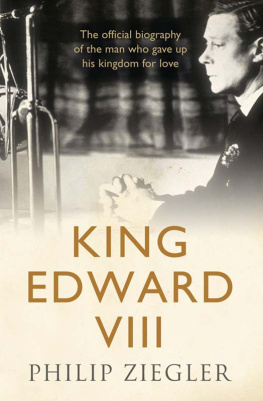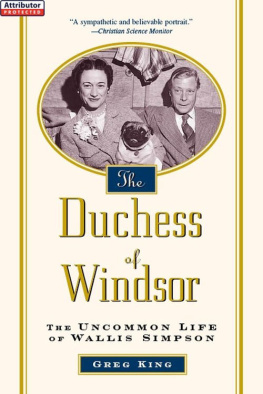T HIS BOOK HAS taken an unusually long time to write as it gradually evolved from one focused on the top-level machinery of British government in the 1930s to one that examines a single episode, so I owe my thanks to a correspondingly long list of individuals and organisations who have helped me on the way.
Professor Nick Crowson of Birmingham University took me on as graduate student and shared his immense knowledge of the period as well as introducing me properly to the study of history. The late Sir Martin Gilbert provided limitless inspiration and encouragement when I pursued my research into Sir Horace Wilson. Professor Eunan OHalpin of Trinity College, Dublin and Professor George Peden of Stirling University guided me through the higher reaches of the British Civil Service. Michael Jago steered me through the intricacies of Labour Party politics. John Campbell shared his huge knowledge of David Lloyd George as well as his generous support and hospitality. Julian Hardinge (Lord Hardinge of Penshurst) very helpfully challenged some of my early preconceptions. My former colleague Bernard (Lord) Donoughue explained clearly the importance of power geography at 10 Downing Street. The opinions and judgements expressed in the book are, of course, entirely my own.
I am especially grateful to a number of individuals who have allowed me access to papers still in their personal possession: Lord and the late Lady Crathorne, who received me most hospitably at Yarm; the Honourable Lady Murray, her son Alex and her nephew Lord Hardinge for the diary of Helen, Lady Hardinge; and Mrs Annie Pollock, who very kindly showed me the papers of her grandfather, Sir Warren Fisher.
My thanks go to everyone at the following archives who assisted me in my research: the Churchill Archives Centre, most especially Andrew Riley, who has been unstinting with his time, efforts and advice; the BBC Written Archives Centre, with special thanks to Jeff Walden; the Cadbury Research Library: Special Collections at the University of Birmingham, in particular Sue Worrall and Ivana Frlan; the Reuters archive, practically synonymous with John Entwistle; the Bank of England Archives with special thanks to Rachael Muir; Balliol College, Oxford, in particular Anna Sander; the Local Studies Library at Aberdeen in the person of David Oswald; the National Archives at Kew; Bundesarchiv, Koblenz; The House of Lords Record Office: Special Collections at the University Library, Cambridge; and the RAF Museum, Hendon. Terry Maces help was invaluable for the photo of the Kings aeroplane.
The following individuals and institutions have kindly granted me permission to use material under their control: Lord Norwich for his fathers diary; Lord Crathorne for his parents papers; the Honourable Lady Murray and Lord Hardinge for the papers of Helen, Lady Hardinge and her Loyal to Three Kings; the BBC Written Archives Centre for Sir John Reiths diaries; the Cadbury Research Library: Special Collections, the University of Birmingham for Neville Chamberlains papers; and the Parliamentary Archives for material from the Beaverbrook papers. The quotations from the writings of Sir Winston Churchill are reproduced with the permission of Curtis Brown, London on behalf of the Estate of Winston S. Churchill. The Estate of Winston S. Churchill. Every effort has been made to trace copyright holders and to obtain their permission for the use of copyright material. The author apologises for any errors or omissions in the above list and would be grateful if notified of any corrections that should be incorporated in future reprints or editions of this book.
Mrs Jackie Holland sang to me most beautifully the snatch of playground doggerel about Mrs Simpson that she remembered from 1936, and her daughter, Jane Holland, very kindly transcribed it. Mrs Vanessa Donegan made good my ignorance of tactics in contract bridge. Mme Gautier of the Domaine de Cand provided me with the programme of music played at the Duke of Windsors wedding to Wallis Warfield (as she had very briefly become again) and M. Proust of Tours Cathedral introduced me to the splendours of the Skinner organ at Cand and explained the intricacies of playing it.
Laurie De Decker, my editor at Biteback, whipped my manuscript into shape and introduced me to the previously unfamiliar world of the comma. She and everyone else at Biteback gently guided me through the process of bringing my first book from outline to publication.
Lastly, this book would not have been possible without the help of my wife Sheila, whom I wish to thank for her advice, patience and support.
O N THURSDAY 10 December 1936, the British Prime Minister Stanley Baldwin was hurrying to prepare for one of the most important speeches of his political life and one of the most vital speeches ever delivered to the House of Commons. He had to explain how and why King Edward VIII was abdicating after a reign of only eleven months. In January, Edward had become King in the midst of hopes that this glamorous, charming and handsome figure would usher in a new style of monarchy in Britain. After the Victorian-era austerity of his father, George V, he had appeared open and modern. Instead, there had been a worldwide scandal and finally an agonising crisis that had played out in semi-privacy for months before the British press had broken its self-imposed silence the previous Wednesday, catapulting the affair into the full glare of public knowledge and concern. For a week, the whole country had stared into the abyss of a constitutional crisis.
Time was short for Baldwin because the Kings final and irrevocable decision had only been taken late the evening before. More for the sake of form than anything, the Cabinet had sent the King a message imploring him to reconsider his intention, but he had not and had signed the Instrument of Abdication that morning at his private house, Fort Belvedere, in the grounds of Windsor Castle. Now Baldwin had to give final confirmation to Parliament and the world beyond, that what had been rumoured and feared for months, weeks and days had finally occurred. Even that morning the newspaper headlines in London had only spoken of the possibility of abdication. Baldwin had to find a way of presenting the bitter reality in a way that minimised the damage and somehow overcame the hurt of those traumatic days. The monarchy was the sacred institution that bound the people of Britain and cemented an Empire that spanned the globe, but its sovereign had decided that he could not carry on because he was not permitted to marry the woman he loved. If Baldwin were to say the wrong thing, the results might be catastrophic. Few had questioned his handling of the crisis whilst it was in progress, but now that it had culminated in the terrible conclusion of abdication, there might be deep and savage recriminations and aftershocks. The leader of the opposition Labour Party had had to fight down the temptation elsewhere in his party to make tactical capital out of the crisis, and Oswald Mosleys British Union of Fascists had campaigned to keep Edward on the throne.
Baldwin worked on his speech entirely alone. The one thing he had to guide him was a log of the day-to-day events of the crisis prepared for him by his civil service right-hand man, Sir Horace Wilson. It was not just the appearance of the notes that betrayed the stress of the moment. As Baldwin moved around 10 Downing Street in distracted concentration, he dropped some of the slips in the passageways. When he finally set off for the House of Commons, he completely forgot to bring the notes with him, and his parliamentary private secretary, Tommy Dugdale, had to dash back to retrieve them.

